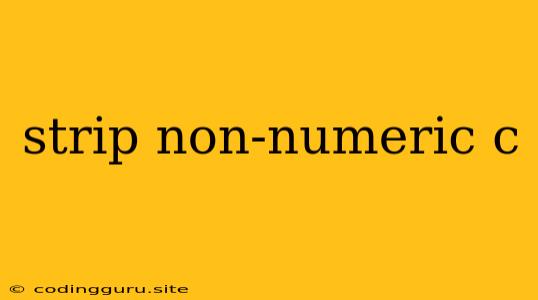Stripping Non-Numeric Characters in C: A Comprehensive Guide
Removing non-numeric characters from a string is a common task in C programming, especially when dealing with data that requires numerical processing. This guide will provide you with a comprehensive understanding of how to achieve this using various techniques and best practices.
Why Strip Non-Numeric Characters?
Before diving into the solutions, let's understand the necessity of removing non-numeric characters from a string. Here are some typical scenarios:
- Data Validation: Ensuring that user input or data from external sources consists only of numbers is crucial for accurate calculations and preventing errors.
- Numerical Operations: Converting strings to numbers often requires removing any non-numeric characters to prevent conversion errors.
- Data Parsing: Extracting numerical data from text files or other data sources frequently involves removing non-numeric characters.
Methods for Stripping Non-Numeric Characters
Let's explore the most efficient and commonly used methods to strip non-numeric characters in C:
1. Using isdigit() Function
The isdigit() function from the ctype.h header file is a standard library function that checks if a character is a digit (0-9). We can use this function to filter out non-numeric characters:
#include
#include
int main() {
char str[] = "123abc456";
int i, j;
for (i = 0, j = 0; str[i] != '\0'; i++) {
if (isdigit(str[i])) {
str[j++] = str[i];
}
}
str[j] = '\0';
printf("String after removing non-numeric characters: %s\n", str);
return 0;
}
Explanation:
- We iterate through the string using a loop.
- For each character, we check if it's a digit using
isdigit(). - If it's a digit, we copy it to the original string's position
j. - The loop continues until the end of the string is reached.
2. Using strtol() Function
The strtol() function from the stdlib.h header file converts a string to a long integer and skips leading whitespace and non-numeric characters. We can use this function to extract the numerical part of a string:
#include
#include
int main() {
char str[] = "123abc456";
char *endptr;
long val = strtol(str, &endptr, 10);
printf("Numeric part of the string: %ld\n", val);
return 0;
}
Explanation:
strtol()takes the string, a pointer to the end of the converted string, and the base of the number system (10 for decimal).- It returns the long integer value, and
endptrpoints to the first non-numeric character after the conversion.
3. Regular Expressions
Regular expressions are powerful tools for pattern matching. We can use regular expressions to match non-numeric characters and replace them with an empty string:
#include
#include
#include
int main() {
char str[] = "123abc456";
char *new_str;
regex_t regex;
int reti;
reti = regcomp(®ex, "[^0-9]", REG_EXTENDED);
if (reti) {
fprintf(stderr, "Could not compile regex\n");
return 1;
}
new_str = malloc(strlen(str) + 1);
if (new_str == NULL) {
fprintf(stderr, "Memory allocation failed\n");
return 1;
}
reti = regexec(®ex, str, 0, NULL, 0);
if (!reti) {
strcpy(new_str, str);
} else if (reti == REG_NOMATCH) {
strcpy(new_str, str);
} else {
fprintf(stderr, "Regex match failed: %d\n", reti);
return 1;
}
printf("String after removing non-numeric characters: %s\n", new_str);
regfree(®ex);
free(new_str);
return 0;
}
Explanation:
regcomp()compiles the regular expression[^0-9](matching any character except digits).regexec()attempts to match the regular expression against the string.- If there's a match, we replace the matched non-numeric characters with an empty string.
4. Using strspn() and strcspn()
These functions are useful when you need to identify substrings within a string. strspn() calculates the length of the initial substring containing only characters from a specified set, while strcspn() calculates the length of the initial substring not containing any characters from a specified set.
#include
#include
int main() {
char str[] = "123abc456";
char digits[] = "0123456789";
int i, j;
for (i = 0, j = 0; str[i] != '\0'; i++) {
if (strspn(&str[i], digits) > 0) {
str[j++] = str[i];
}
}
str[j] = '\0';
printf("String after removing non-numeric characters: %s\n", str);
return 0;
}
Explanation:
- We iterate through the string.
- For each character,
strspn()checks if it's a digit. - If it's a digit, we copy it to the original string's position
j.
Considerations and Best Practices
- Choosing the Right Method: The best method depends on your specific requirements and the complexity of your data.
isdigit()is suitable for simple scenarios, whilestrtol()is more effective for extracting numerical values. Regular expressions offer flexibility for complex patterns. - Memory Management: When using methods that allocate memory (e.g., regular expressions), remember to deallocate it after use to avoid memory leaks.
- Error Handling: Handle potential errors, such as invalid inputs or memory allocation failures.
Conclusion
Stripping non-numeric characters from strings in C is a fundamental task in many programming scenarios. This guide provided a comprehensive overview of various techniques, including using isdigit(), strtol(), regular expressions, and strspn()/strcspn(). By understanding these methods and their strengths and limitations, you can confidently choose the most appropriate approach for your specific needs. Remember to prioritize code clarity, efficiency, and error handling for robust and reliable solutions.
